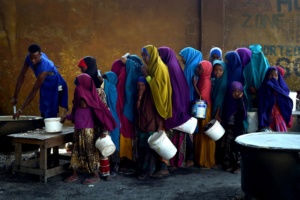While Syrian President Bashar al-Assad was accusing the West of turning a blind eye to Islamic State smuggling, a member of his parliament was quietly doing business with the group, farmers and administrators in the militants’ former stronghold said.

The arrangement helped the Syrian government to feed areas still under its control after Islamic State took over the north-eastern wheat-growing region during the six-year-old civil war, they said.
Traders working for businessman and lawmaker Hossam al-Katerji bought wheat from farmers in Islamic State areas and transported it to Damascus, allowing the group to take a cut, five farmers and two administrators in Raqqa province told Reuters.
Katerji’s office manager, Mohammed Kassab, confirmed that Katerji Group was providing Syrian government territories with wheat from the northeast of Syria through Islamic State territory but denied any contact with Islamic State. It is not clear how much Assad knew of the wheat trading.
Cooperation over wheat between a figure from Syria’s establishment, which is backed by Shi‘ite power Iran, and the hardline Sunni Islamic State would mark a new ironic twist in a war that has deepened regional Sunni-Shi‘ite divisions.
Reuters contacted Katerji’s office six times to request comment but was not given access to him.
His office manager Kassab, asked how the company managed to buy and transport the wheat without any contact with Islamic State, said: “It was not easy, the situation was very difficult.” When asked for details he said only that it was a long explanation. He did not return further calls or messages.
Damascus, under U.S. and EU sanctions over the conflict and alleged oil trading with Islamic State, strongly denies any business links with the hardline Islamist militants, arguing that the United States is responsible for their rise to power.
The self-declared caliphate they set up across large parts of Syria and Iraq in 2014 has all but collapsed after Western-backed forces drove them out of their Iraqi stronghold, Mosul and surrounded them in Raqqa, where they are now confined to a small area.
Russian and Iranian-backed Syrian forces are attacking them elsewhere, such as Deir al Zor on Syria’s eastern border, where Kassab says he was speaking from, in a continuing struggle for the upper hand between world powers.
Five farmers in Raqqa described how they sold wheat to Katerji’s traders during Islamic State rule in interviews at the building housing the Raqqa Civil Council, formed to take over once the city is retaken.
“The operation was organised,” said Mahmoud al-Hadi, who owns agricultural land near Raqqa and who, like the other farmers, had come to the council’s cement offices to seek help.
“I would sell to small traders who sent the wheat to big traders who sent it on to Katerji and the regime through two or three traders,” he said.
He and the other farmers said they all had to pay Islamic State a 10 percent tax, or zakat, and sold all of their season’s supplies to Katerji’s traders under the multi-layered scheme.
Local officials said Katerji’s traders bought up wheat from Raqqa and Deir al-Zor and gave Islamic State 20 percent.
“If a truck is carrying 100 sacks, they (Islamic State) would keep 20 and give the rest to the trucker,” said Awas Ali, a deputy of the Tabqa joint leadership council, a similar, post-Islamic State local body allied to the Kurdish-led forces now attacking Raqqa.
Ali said he learned of the details of the arrangement with Katerji by speaking with Islamic State prisoners and others who worked in the group’s tax collection and road tolling systems.
“Katerji’s trucks were well known and the logo on them was clear and they were not harassed at all,” Ali said, adding that Katerji’s people were active during the last buying season, which lasts from May to August. The farmers also said the trucks were identifiable as Katerji‘s.
The truck drivers were even allowed to smoke cigarettes as they passed through the checkpoints, something Islamic State enforcers punished with whippings elsewhere, Ali and several other sources said.
“I would sell an entire season’s supplies to Katerji’s traders,” said farmer Ali Shanaan.
“They are known traders. The checkpoints stopped the trucks and Daesh would take a cut and let them pass,” he said, using an Arabic acronym for Islamic State.
The wheat was transported via the “New bridge” over the Euphrates River to a road leading out of Raqqa, the farmers and local officials said. Control of the bridge is now unclear as the militants in Raqqa come close to defeat.
Raqqa-based lawyer Abdullah al-Aryan, who said he had been a consultant for some of Katerji’s traders, said Katerji’s trucks brought goods into Islamic State territory as well as wheat out.
“Food used to come from areas controlled by the government. Medicine and food,” he said.
Islamic State rule involved shooting or beheading perceived opponents in public squares, imposing its own extreme version of sharia, Islamic law, and then providing basic goods such as bread and setting up ministries and taxation.
Several farmers said they saw Islamic State documents which were stamped at checkpoints to allow the wheat trucks to pass. They belonged to the department which imposes taxes.
Kindly follow us on twitter:@AfricanVoice2










